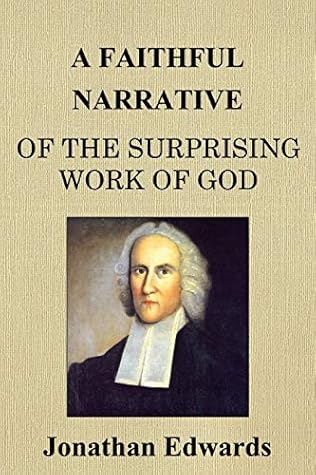- Bible
- Read the Bible
- Bible Versions
- Verse of the Day
- Reading Plans
- Verses by Topic
- Books of the Bible
- Bible Images
- Study
- Commentaries
- Concordances
- Dictionaries
- Encyclopedias
- Sermons
- Bible Atlas & Maps
- BP Wiki
- Devotionals
- Today's Devotionals
- Light of the World
- All Devotionals
- Inspirational Quotes
- More
- Picture Quotes
- Videos
- Inspirational
- Bible Study
- What The Bible Says
- Bible Q&As
- Daily Bread
- Bible by Genre
- Bible Stories
- Random Bible Verse
- Community
- Store
A Faithful Narrative of the Surprising Work of God: in the Conversion of many Hundred Souls in Northampton, of New-England
by Jonathan Edwards
A Faithful Narrative of the Surprising Work of God is Jonathan Edwards' account of the revival that broke out in Northampton, Massachusetts and other nearby communities which was the start of what later became known as The Great Awakening (1734-43), also called the First Great Awakening. There is much we can learn from Edwards concerning the nature of genuine conversion and how God's Spirit works in awakening and converting sinners. A Faithful Narrative is reproduced here in the hopes that many people will benefit from the wisdom learned by Edwards, called the greatest evangelist ever to grace the American continent.Different editions of this book had different chapter divisions, but the same information. A few old words we no longer use have been replaced with their modern equivalent, the spelling of a few words have been updated such as to-day to today. And a few very long paragraphs have been made shorter by adding an indentation, otherwise the words and punctuation are the same as original.The final chapter is an account of his early religious experiences and conversion that was found among his papers at his death, and is supposed to have been written at Northampton, when he was about forty years of age. It is not found in all editions of this book, so it is great to have it in this 2019 edition.
BUY NOW
Paperback, 104 pages
Published August 12th 2019 by Independently Published
© 2025 Bibleportal.com All rights reserved.

Jonathan Edwards (1703 - 1758)
was a Christian preacher and theologian. Edwards "is widely acknowledged to be America's most important and original philosophical theologian," and one of America's greatest intellectuals. Edwards's theological work is broad in scope, but he was rooted in Reformed theology, the metaphysics of theological determinism, and the Puritan heritage. Recent studies have emphasized how thoroughly Edwards grounded his life's work on conceptions of beauty, harmony, and ethical fittingness, and how central The Enlightenment was to his mindset. Edwards played a critical role in shaping the First Great Awakening, and oversaw some of the first revivals in 1733–35 at his church in Northampton, Massachusetts.Edwards delivered the sermon "Sinners in the Hands of an Angry God", a classic of early American literature, during another revival in 1741, following George Whitefield's tour of the Thirteen Colonies. Edwards is well known for his many books, The End For Which God Created the World, The Life of David Brainerd, which served to inspire thousands of missionaries throughout the 19th century, and Religious Affections, which many Reformed Evangelicals still read today.
Jonathan Edwards was a colonial American Congregational preacher, theologian, and missionary to Native Americans. Edwards "is widely acknowledged to be America's most important and original philosophical theologian."
His work is very broad in scope, but he is often associated with his defense of Reformed theology, the metaphysics of theological determinism, and the Puritan heritage. His famous sermon "Sinners in the Hands of an Angry God," is credited for starting the First Great Awakening. Edwards is widely known for his books Religious Affections and The Freedom of the Will. He died from a smallpox inoculation shortly after beginning the presidency at the College of New Jersey (later to be named Princeton University). Edwards is widely regarded as America's greatest theologian.
Jonathan Edwards was the only boy among eleven children. In 1720 he graduated from Yale as the valedictorian of his class. He continued at Yale working on a graduate degree in theology and was saved at the age of seventeen. Edwards was ordained in 1727 and joined his grandfather as an assistant pastor. In 1729 he became pastor of the church in Northampton, Massachusetts, which had some six hundred members. In 1735 God's blessing on his preaching resulted in a great revival with more than three hundred people saved and added to the church. Edwards is considered to be one of the men most responsible for the Great Awakening. His famous sermon, "Sinners in the Hands of an Angry God," was first preached in 1741 at Enfield, Massachusetts. In 1750 Edwards was voted out by his church after his attempt to limit church membership to those who made a profession of faith in Christ.
He spent the next seven years as a missionary to the Indians at Stockbridge, Massachusetts. In 1758 he accepted the presidency of the College of New Jersey (now called Princeton). After just weeks on the job, he died from smallpox brought on by an inoculation to protect him from the disease. Jonathan Edwards and his wife had eleven children. He spent one hour each night in conversation and instruction with his family. His daughter Jerusha was engaged to David Brainerd when he died of tuberculosis. Edwards' two most famous literary works are The Life and Diary of David Brainerd (1749) and Freedom of the Will (1754). Edwards is buried in Princeton, New Jersey.
... Show more